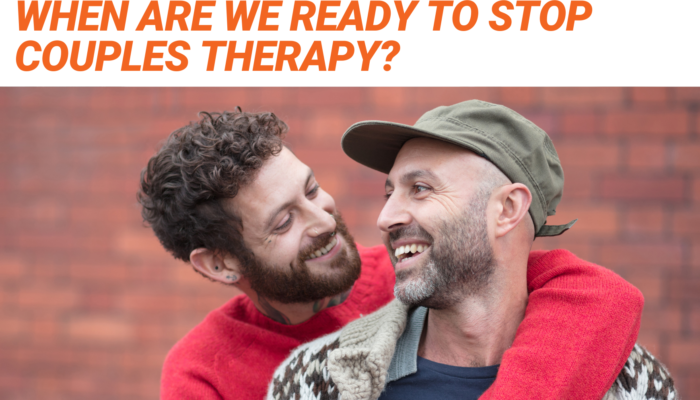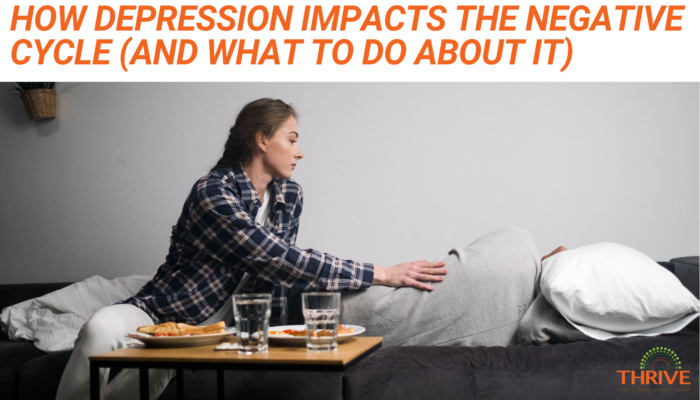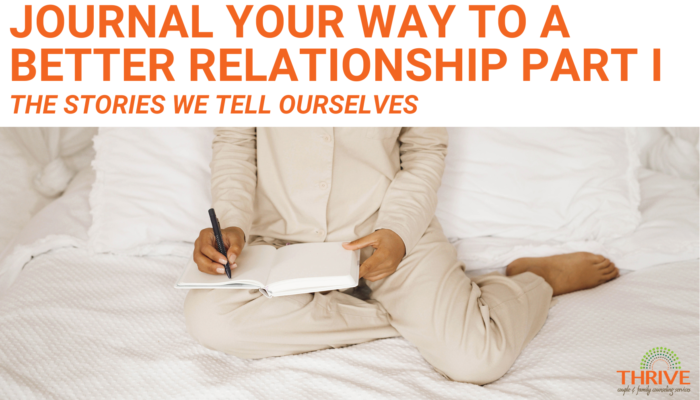How do you know when you are ready to stop couples therapy? It’s a good idea to carefully plan the decision to end couples or marriage therapy, so we want to offer the end goals for all couples we work with in Emotionally Focused Couple Therapy.
Some couples feel safe and comfortable with their counselor, and ending this relationship can feel similar to a break up, while others equate counseling sessions to a necessary health requirement, like going to the dentist. Those couples prefer to stop couples therapy as soon as possible.
Whether it is ending too soon, or hanging on too long, goodbyes with your therapist are important.
Emotionally Focused Couples Therapy Goals
Emotionally Focused Therapy (EFT) differs from traditional couples therapy in many ways, particularly the length and depth. The goals in EFT are different, and based off of research that tells us how couples get better in long-lasting ways. In EFT, we don’t do relationship Band-aids, we aim for deep, meaningful and lasting change.
We think of EFT like a two part system. First, we address the negative pattern of behaviors. Then, we help you find new, deeper ways of connecting that don’t lead to conflict and disconnection.
Emotionally Focused Therapy focuses on creating intimate relationships and deep bonds, not on exercises or memorization. This is why you won’t see any worksheets on “I” statements or thought patterns in EFT. EFT goes much deeper.
Research shows that when a person is in crisis with the one they love, they will rarely use logic and reasoning to remember the communication skills and worksheets.
Typically, couples don’t think and just react by switching very quickly into survival mode. Unfortunately, our reactive behaviors rarely offer helpful long-term results. We can’t run from our partner like we’d escape from a lion or attack our partner like we would an intruder.
However, in order to improve a couple’s interactions and have the results last, EFT requires clients and therapists to meet for a sufficient amount of time to de-escalate the repetitive negative cycle of interaction couples get caught in. But we can’t stop at de-escalation.
We also need to identify the roots from where this negative pattern sprouts, and help you to connect intimately and bond in entirely new ways.
Stopping Therapy Too Soon
“But, we’ve been to counseling for a while and we feel better. We rarely argue. I don’t think we need it anymore. We’re fixed!”
Not so fast…
Just because you can see what is happening to you now and identify the negative cycle you get caught in together, this does not mean our work is finished. Cycles are tenacious and can appear at any stressful point in our lives with our partner. A cycle you had, for example, after your honeymoon may get triggered again after you have your first child.
Identifying and de-escalating this pattern is only the first hurdle. Without addressing why this cycle crept back into interactions, couples leave themselves vulnerable to its spontaneous reappearance.
Think of this first step of cycle de-escalation like medical treatment. While it’s nice to feel healthier after you take the medicine, it’s important to know what caused the illness in the first place, so you don’t end up at the doctors again the next time your body is sick. When it comes to healthy love, prevention is everything!
One of the main reasons EFT has such lasting results is because it addresses core issues of each partner. This means, while on the surface things are flowing better, underneath, if not addressed, there are still unresolved root dynamics at play.
Traditional Emotionally Focused Therapy will require time to process these core emotions and fears of each partner, and help them to resolve and navigate these in their relationship – even after the cycle has seemingly disappeared.
Congratulations, it’s time to graduate from couples therapy!
Couples therapy is a unique experience. For some, it’s the only time out of their busy lives to connect and solely focus on their relationship. For this reason, this precious space is sometimes hard to give up.
“Yeah, we’re doing better, but I think it’s nice to have this check in. You never know what might happen down the line.”
“Our therapist knows us so well, we wish we could bring her with us.”
While it’s nice and sometimes even flattering when clients protest to stay in therapy, the healthiest option is for the relationship to go back to both partners caring for it.
A therapist’s job is to help couples learn how to navigate these emotions and have these connecting conversations on their own. In essence, the therapist is working themselves out of a job.
It is in no ones best interest to leave therapy early; however, it is also not in your best interest to stay beyond your need either.
EFT therapists work to empower couples to become more aware of their emotional experience and share this with their partner. Eventually, EFT helps couples to create a new self sustaining interaction cycle, where a couples counselor is no longer necessary.
“But we’re scared!”
Sure! Leaving therapy is a big step, but it’s a necessary one for you to build confidence in your relationship’s capabilities. A therapist would never push you out before they had seen evidence that you were secure enough and your bonds strong enough to stand on your own.
You’ve made it this far! Trust your therapist and your partner who got you there. It’s time to say goodbye.
Wrapping Up Therapy
Whether you want to leave sooner or hang on longer, it is recommended that you take time to process this decision with your counselor.
Typically this process is discussed and processed over a few sessions. A therapist will never spring a last appointment on you. This should never be a surprise.
An important part of ending therapy is making sure to make time for a graduation session. This will allow you and your partner to celebrate all of your progress and make sense of your journey together.
Together, you will want to pay attention to the beginning, rough spots, and break-throughs to help integrate your therapy experience into your life now.
Bringing closure to this relationship with your couples counselor can offer extra peace and reassurance as partners venture back into the big world with their newly created security.
Also, like any secure relationship, you can always come back to couples therapy if you feel like you need a tune-up. The good news is that once you’ve created a strong and secure attachment in your relationship, you will be able to get back on track much, much quicker.
Now it’s time to look to the future of the relationship. Congratulations—you made it!
If you’re ready to engage in emotionally focused therapy with your partner and make lasting changes that will strengthen your relationship, contact our Denver couples counselors: 303-513-8975, X1, or schedule online at: Schedule Appointment




